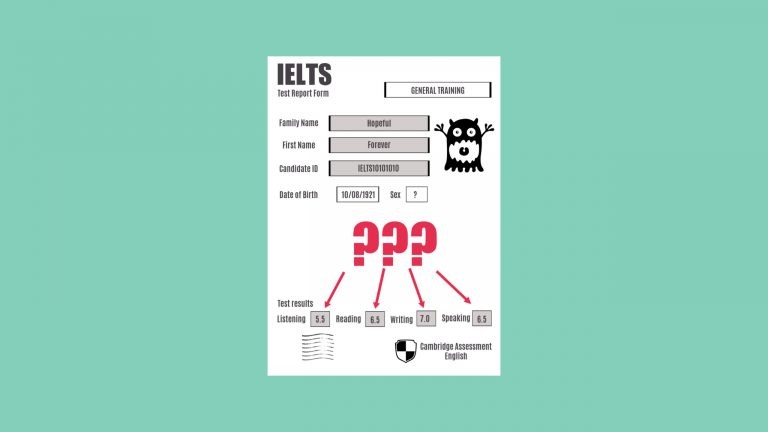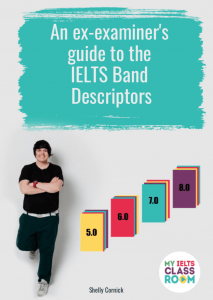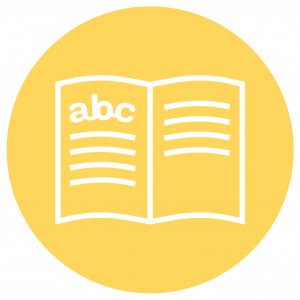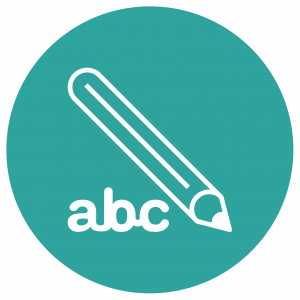
What your previous IELTS results tell me ……
Hey! Every week I get emails from students asking me to help them prepare for IELTS. The first question that I always ask them is “Have you taken the exam before?” Why? Do I care about their knowledge of the test or how many attempts they have already made? Not really. What I want to know is their previous IELTS results so that I can get an instant insight into their current level of English and understanding of academic skills.
Interestingly, an overall score does not help me to do this – you can have a range of students with different needs who all have a 6.0 or 6.5 overall (or even a 7.0 or 7.5!). What I need to see are the scores for the individual parts of the test. So, what do your previous IELTS results tell me about you as a student? Let’s find out!
The student with a level of English that is too low
The easiest students for me to “diagnose” are those who have a set of similar scores across each skill that are all between 5.0 and 6.0. These students will send me results that look like this (remember we usually give scores in this order: listening, reading, writing, speaking).
LRWS: 5.0, 5.5, 5.0, 5.5
LRWS: 6.0, 6.0, 6.0, 5.5
Let me start by saying that these are not “bad” scores – in fact, for students who want to study overseas, these are fantastic and are all that you need! However, most of the test-takers who come to me for help need very high scores i.e. 7.0 or 7.5 overall with a minimum of 7.5 or 8.0 in particular parts of the test. What these scores tell me is that right now these students do not have a level of general English high enough for a 8777 or 7777.
The solution? Take some time away from IELTS to focus on your general English skills i.e. grammar and lexis.
I have written about this extensively in my “What type of IELTS learner are you?” blog post, but the simple truth is that no amount of IELTS “practice” will help you to improve from a 5.0 or 6.0 to a 7.0. or 8.0. If you can take 3 – 6 months to focus on your language and then come back to IELTS, you will improve much more quickly.
Remember, IELTS tests both your level of language and your academic skills, but language is the foundation of everything. Without a B2 level of language, you will never be able to get higher than a 6.0, and if you are aiming for a 7.0, then you will need to be C1 (and if you don’ know what those numbers mean, then maybe read my starting guide to IELTS to find out).

The student with weak academic skills
The second group of students are those who have a great level of language, but a weaker understanding of academic skills. These students will send me results that look like this:
LRWS: 7.5, 6.0, 6.0, 7.0
LRWS: 7.0, 5.5, 6.0, 7.0
The overall scores for these students may not be very different to the first group, but the key here is that the student has high scores for speaking and listening, but lower scores for reading and writing. This tells me A LOT.
If you took a group of native speakers and asked them to take the test with no preparation, they would get similar scores (ie. higher for listening and speaking than the other parts of the test). That is because, in general, the speaking and listening exams do not require any real knowledge of academic skills, which is what these students are lacking. For example, here are just some of the academic skills that are needed for reading and writing:
IELTS Academic Reading Skills
- how to distinguish main ideas from supporting information
- how to understand the writer’s purpose
- how to understand the function of specific sentences
- how to find and analyse specific information in the text
- how to follow a description accurately
- how to summarise a passage
IELTS Academic Writing Skills
- how to logically organise paragraphs
- how to join ideas using cohesive devices
- how to avoid repetition using referencing
- how to give your opinion and other people’s
- how to extend arguments and ensure that they are relevant
Remember, these are not exhaustive lists. There are many other academic skills that are needed to do well in these parts of the test. However, my point is simply that great language skills are no guarantee you will be able to perform well in reading and writing without training.
The good news is that I can help these students to increase their scores relatively quickly. Sure, there is no overnight fix, but there is no reason why you shouldn’t be able to hit a 7.0 within 4 – 8 weeks with the right training. Why? Because these students have demonstrated that they have the underlying language skills needed for a high score.
Find out more about the skills tested in IELTS reading by listening to my Introduction to IELTS Reading Podcast!
The student with weak productive skills
Next, we have the group who score very highly in listening and reading, but get a low score for writing and speaking. In English, we call listening and reading “receptive skills” i.e. ones that we do passively, and speaking and writing “productive skills” i.e. ones that we do actively.
LRWS: 8.5, 7.5, 6.0, 6.5
LRWS: 7.5, 7.5, 5.5, 6.0
The problem here is that these students have a great passive knowledge of English but are not able to actively produce language to the same level. You may think that this is a strange mix of abilities, but I see this combination of scores very often among students who come from an academic background.
These are students who have finished degrees in their own country and are now looking to move abroad to study a Master’s or PhD. Their listening and reading are usually excellent because they have been listening to conferences or reading journal articles in English, but their writing and speaking scores are not as strong because they cannot produce all of the languages that they understand.
This group may look very similar to the last, but there is a fundamental difference – the score for speaking:
LRWS: 7.5, 6.0, 6.0, 7.0 = weak academic skills
LRWS: 7.5, 7.5, 5.5, 6.0 = weak productive skills
Any student who can get a 7.0 for speaking also has the lexis and vocabulary needed to get a 7.0 for writing (and reading). In other words:
- If writing and speaking are low, this shows an underlying problem with language.
- If reading and writing are low, this shows an underlying problem with academic skills.
Interestingly, students with strong receptive skills may have a higher overall score than those with strong language skills (as it is common for students to get 8.0s or even 8.5s for reading and listening) but it can take longer for these students to move up to a 7.0 in each part of the test. Why?
It again comes back to language – academic skills are quick to acquire, but the language is slow.
Even worse, having an 8.0 or an 8.5 for listening and reading may give these students the false impression that they are at a higher level than they really are. This means that they can be demotivated to study and confused about their speaking and writing scores. If you are in doubt about your problem area, look at your speaking score to get an accurate idea of your current potential.
The student who is “close” but not close enough
Finally, we have students who are very close to their required band scores but not quite there. Usually, these are students who have a 7.0 in reading and listening, but a 6.5 in speaking or writing (or both):
LRWS: 7.0, 7.0, 6.5, 6.5
LRWS: 7.0, 7.0, 7.0, 6.5
LRWS: 7.0, 7.0, 6.5, 7.0
I am going to be honest – this group is almost impossible for me to immediately diagnose. I am going to have to do a lot more investigating to find out how to target these students’ problem areas, so let’s look at each in turn:
- 7.0, 7.0, 6.5, 6.5 – Having read my previous comments, what do you think we are going to say to this student? I think that with 6.5 for speaking and writing, then they are definitely going to have to work on their language. However, there are other reasons why people get stuck at a 6.5 in these areas that may not be just language-related – maybe their essays are missing topic sentences and have no extension? Or maybe the student simply pauses too much when they speak for a clear 7.0 for fluency in speaking, or they have problems pronouncing one vowel sound? Without further communication with the student, it will be hard for me to tell, but definitely we want to look at language as much as academic skills here.
- 7.0, 7.0, 7.0, 6.5- This is an interesting score. The student has scored more highly in writing than speaking (which is unusual) and this shows me that they have very good language skills. I would recommend that this student books a speaking test so that we can work out why they were unable to reach a 7.0 for speaking this time. It might be that it is just one problem are that we need to work on before they sit again. My guess, though, would be that it is either Fluency and Coherence or Pronunciation that is holding them back.

- 7.0, 7.0, 6.5, 7.0 – This is the most common score that I see and can have a number of underlying reasons. The student has a 7.0 for speaking, so in theory, they should have enough language for a 7.0 in writing as well, as long as the student does not have problems in spelling or using lexis well in context. Again, we will need to check this before making our diagnosis. However, usually in this situation, what the student is missing are academic writing skills. As we said before, there are literally a dozen places where these students can “go wrong” but all are relatively easy to diagnose with a first analysis. This is the group that may benefit most from downloading my FREE guide to the band descriptors as this will go through each of the marking criteria in detail. It may be that you are struggling in just one area that can be quickly fixed.
I hope that this lesson has helped you to understand how you can use your previous IELTS results to shape your preparation.
Once you have worked out if you need to improve your language skills, your academic skills, your productive skills, or a combination of all three, you can start the real work of focusing on your problem areas. We offer packages that cover all four parts of the test – you can choose yours here 🚀


